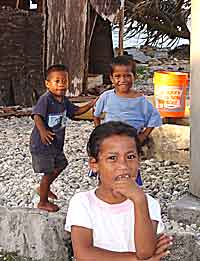







| PROGRAMMES | PROE | PUBLICATIONS, LIBRARY and IRC | SITE MAP | SPREP FORUMS | WEBMAIL - Global / Local | CONTACT | HOME
| Search |
International Waters Project
Community survey improves Marshalls waste management
9/24/2004

A recently published survey could greatly assist the Republic of the Marshall Islands in develop a national plan to address its growing waste problem. In late 2003, Ben Chutaro was contracted by the International Waters Project (IWP) to carry out a “socio-economic survey” of Jenrok, a community on Majuro Atoll in the Marshall Islands. Chutaro says he was shocked by the changes that had occurred in the village where he grew up only 20 years ago. In this densely populated community of almost 2000 people squeezed into a tiny area of less than 0.4 square kilometres, his survey reveals a community living in cramped, unsanitary conditions with growing social problems and increasing rates of suicide.
“Over 80% of Jenrok’s population comes from the Mili and Arno atolls. Many have migrated to Majuro in search of jobs and better health care. Unfortunately, many lack education or job skills to secure regular employment. Instead, they remain with their families, while even more people arrive there in search of work,” he says.
Chutaro says the average household contains around 10 people in two-roomed houses that are barely 20 feet by 20 feet in size. “Some homes have up to 24 people living in them. Most homes are in poor conditions and people do not have access to clean and drinkable water. The houses are so packed that there are hardly any places for kids to play.”
He says the survey showed some disturbing trends in a community where well over half the population is under the age of twenty-four.
“We found the unemployment rate was nearly 50 percent and we found levels of teen pregnancies and suicide that were higher than the national average. We also found a lot of alcohol related problems, particularly with young males, and increasingly with young girls.”
The International Waters Project (IWP) is attempting to help communities improve the way they manage their own environment and coastal resources. Jenrok is one of 14 small communities scattered around the Pacific that have volunteered to become part of the project as a way of trying to take charge of their own future.
As Chutaro explains, “when people in Jenrok ask me what a socio-economic survey is, I say ‘it’s like when you do an audit of a business to find out exactly what’s happening and how you can improve it’. Because IWP is trying to develop a complete picture of the community, I believe we can really start to try and figure out how to improve the living conditions in Jenrok.”
According to the Marshalls’ Economic Policy, Planning and Statistics Office (EPPSO), “solid waste is the greatest immediate environmental problem” facing the country. Chutaro agrees.
“The lack of properly managed solid waste disposal in Jenrok has led to an unsightly and unhealthy environment in Jenrok. Due to the infrequency of the trash pick-up, there is an increased risk of the spread of diseases, especially diseases that can be easily spread by rats,” he says.
Chutaro says the IWP is trying to collect information that will help the community address the root causes of the waste problem in Majuro. “This survey is the first of its kind in the Marshall Islands and the entire country will benefit from this information. This report has already prompted more surveys because people are saying they didn’t realise these conditions really existed. This means that we will be able to compare conditions in Jenrok with the rest of the country and use the comparisons to help develop an approach that genuinely meets the needs of our people.
“I believe we have to look at getting the community engaged in managing solid waste and recycling as a first step. If we demonstrate the benefits of recycling and the proper disposal of solid waste it would go a long way towards improving the living environment in Jenrok.”
The IWP has made a great start by establishing community collection areas for cans, batteries and plastics. But we need to keep finding ways to help people reduce the amount of rubbish that is getting into the neighbourhood and the wider environment,” he says.
Chutaro believes the real benefit of the IWP survey is that it will help provide valuable information for the development of a national plan to effectively address the waste problem in the Marshall Islands.
“There is potential for improving activities at the grassroots level, but the waste problem really needs to be addressed at the national level. If we really want to solve this problem, we need to create clear lines of authority and accountability for dealing with our waste.”
The IWP project is funded through the Global Environment Facility and the United Nations Development Programme, and managed by the South Pacific Regional Environment Programme (SPREP) in partnership with the participating countries. IWP is working with these communities to help them understand the root causes of their problems and how they can implement their own solutions.
Contact Name |
Steve Menzies |
e-mail |
sprep@sprep.org.ws |
Phone |
(685) 21929 |
Fax |
(685) 20231 |
.
